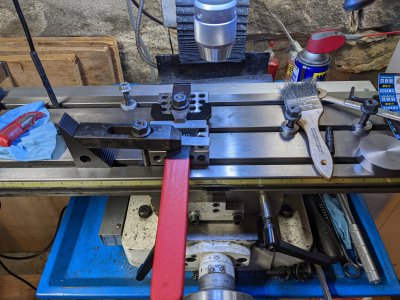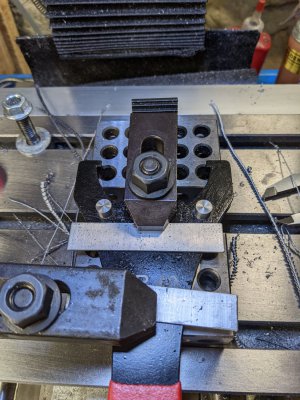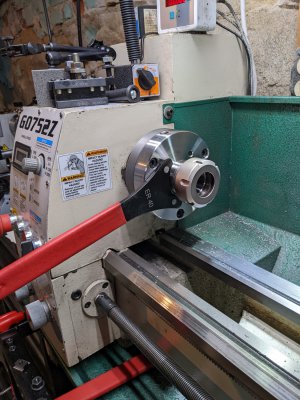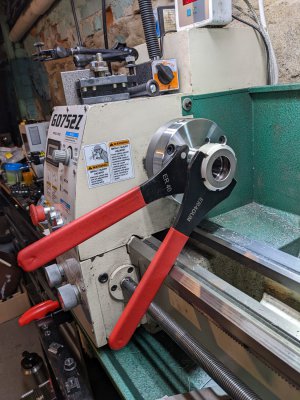- Joined
- Dec 18, 2019
- Messages
- 7,333
A while back I made a back plate for my Shars ER40 Collet Chuck. I still don't have a good way to tighten the collet nut properly. I can't quite grasp the chuck in a 5" 3 jaw chuck so I could drill in on my mill. If I could do that, then I could use a simple tommy bar to restrain the chuck while tightening the nut. There is no back gear, nor a lock on my lathe, so I need to come up with something. Staring at the chuck reveals there are 4 holes, spaced 90 degrees apart. These are 8mm in diameter and counter bored to 11mm deep. So I got the idea that I could make a pin spanner wrench.
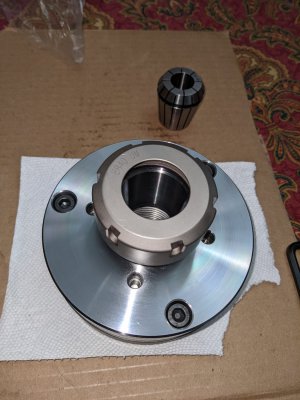

The drawing Shars provides, does not call out these holes. However, I contacted Shars and they provided me the dimensions. 71mm bolt circle, 8mm OD counterbore to 11mm, 6mm through. Armed with this information, thought it was possible to make a wrench. I didn't want to make the wrench out of raw stock - mostly because I would have to buy it. Looked around and the answer was staring me in the face. Just modify an ER40 collet nut wrench. So I found a cheap wrench on Amazon that got me nearly where I needed to be.
I thought this wouldn't be that hard. Mmm, it is tougher than I expected. It's more confusing than I thought. I need enough meat in the wrench to hold the pins. Eventually modeled enough of the existing wrench to determine how to do this. There's not that much clearance to things. The wrench is 6mm thick, the pins can only stick out about 6mm, because the collet nut is being tightened towards the chuck. I think there is about 14mm when the nut is tightened, but need to check. Wouldn't want a wrench that gets stuck by the tightened nut!
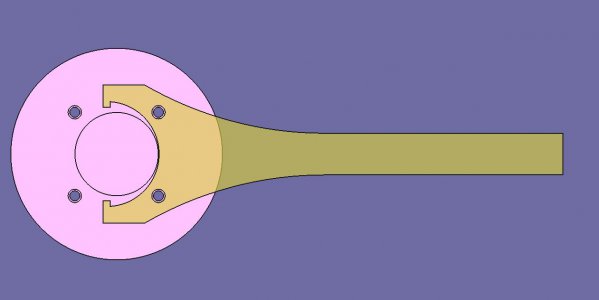
"Basically all I need to do is drill two holes that are the right distance apart and press in two pins." I suspect there will be more to it than that! Was thinking of using some dowel pins, but as I recall they are hardened. I also am treading new ground by pressing the pins into steel, haven't done that before. I have some 3/8" OD 1144 rod I can use for the pins. I can turn it to 7.5mm for 6mm length and 8.01mm for 6mm length. Have a 0.3135" reamer to use, which is 7.975mm, which is 0.001" under 8mm. Think I will make a practice piece just to test pressing the pins. I have some 1/4" steel plate which ought to be similar enough to the tool itself.
I will probably grind off the ears of the wrench back near to the pins, but first, lets practice pressing a pin into steel.


The drawing Shars provides, does not call out these holes. However, I contacted Shars and they provided me the dimensions. 71mm bolt circle, 8mm OD counterbore to 11mm, 6mm through. Armed with this information, thought it was possible to make a wrench. I didn't want to make the wrench out of raw stock - mostly because I would have to buy it. Looked around and the answer was staring me in the face. Just modify an ER40 collet nut wrench. So I found a cheap wrench on Amazon that got me nearly where I needed to be.
I thought this wouldn't be that hard. Mmm, it is tougher than I expected. It's more confusing than I thought. I need enough meat in the wrench to hold the pins. Eventually modeled enough of the existing wrench to determine how to do this. There's not that much clearance to things. The wrench is 6mm thick, the pins can only stick out about 6mm, because the collet nut is being tightened towards the chuck. I think there is about 14mm when the nut is tightened, but need to check. Wouldn't want a wrench that gets stuck by the tightened nut!

"Basically all I need to do is drill two holes that are the right distance apart and press in two pins." I suspect there will be more to it than that! Was thinking of using some dowel pins, but as I recall they are hardened. I also am treading new ground by pressing the pins into steel, haven't done that before. I have some 3/8" OD 1144 rod I can use for the pins. I can turn it to 7.5mm for 6mm length and 8.01mm for 6mm length. Have a 0.3135" reamer to use, which is 7.975mm, which is 0.001" under 8mm. Think I will make a practice piece just to test pressing the pins. I have some 1/4" steel plate which ought to be similar enough to the tool itself.
I will probably grind off the ears of the wrench back near to the pins, but first, lets practice pressing a pin into steel.



